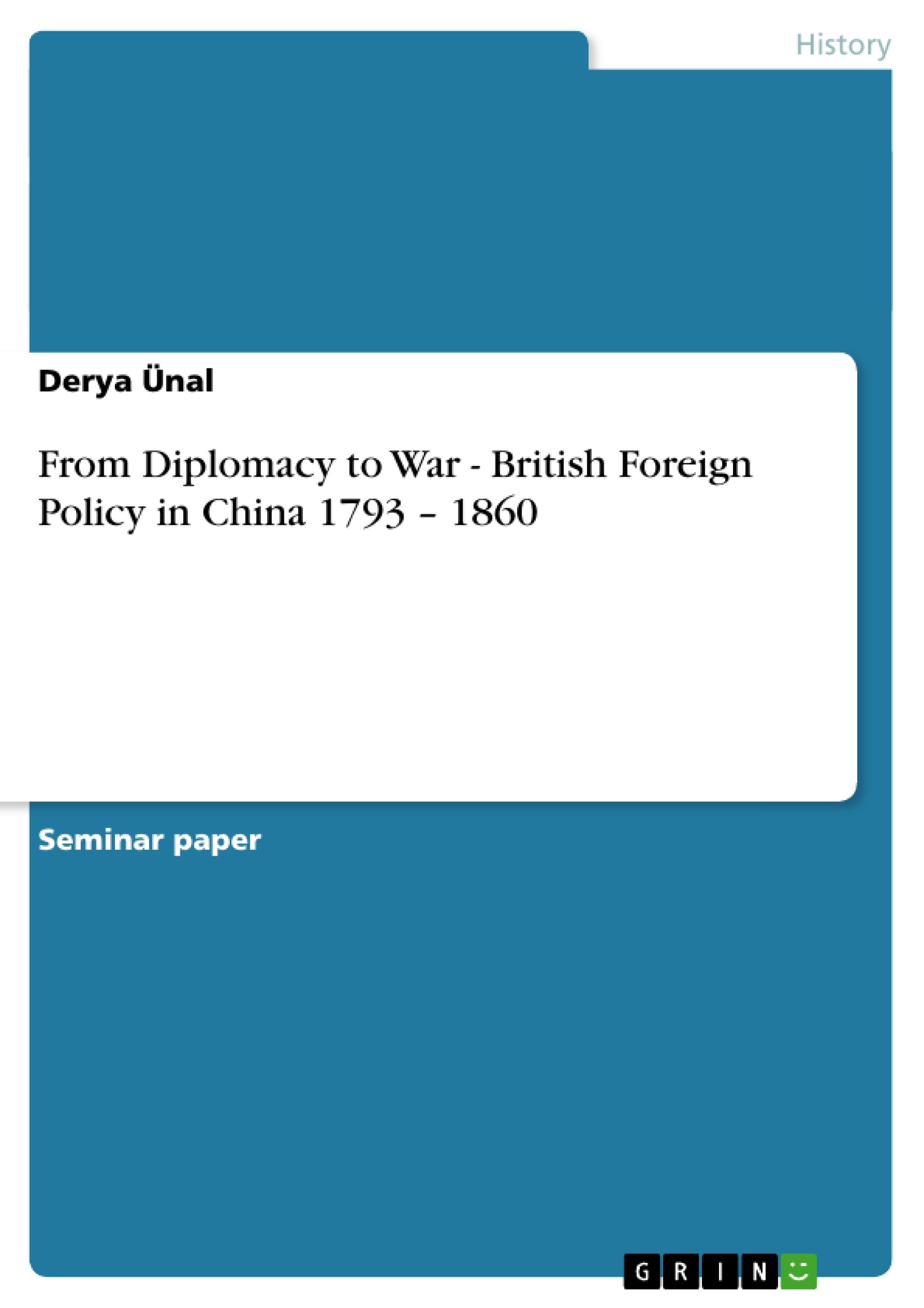From the beginning, British trade with China was restricted to confinements in Canton, as the Qing Emperors saw the foreign intruders as a potential threat and were keen on keeping the foreigners beyond their borders and under tight control. This relationship between the two Empires only changed at the beginning of the 19th century when the British decided to renew their trade interests in the Far East. The following time was then characterized by an increase of diplomatic efforts between the expansionist British and the reluctant Qing Emperors, which was eventually disrupted by war.
In this paper, I want to analyse the development of the British political and economic relations to China, during the period of time in 1793 – 1860. This period was chosen as it marked a turning point in the Anglo-Chinese relations, causing events that immensely affected the histories of both Empires to come, and leading to the rise of one, and the downfall of the other. The year 1793 witnessed the journey of the Macartney Embassy to the court of the Qing Emperor, which was the first renewed attempt to secure trade concessions for the unsatisfied East India Company. This first diplomatic act was bound to failure due to the fundamental differences in cultural self-conception. The subsequent events demonstrate the continuation of failed awareness from two Empires each seeing themselves as the centre of the world. In this way, the tensions during this time between the powers were also influenced by the change from a cultural to an economic clash, exposing the interests of both nations in the conflict. The failure of diplomatic measurements is of particular interest in this case, as they gave rise to the catastrophic events of the two Opium Wars. In order to understand this process, I will focus on the employed strategies and policies by the British to reach their goals of opening China to trade. Further, the aim is to provide an evaluation of both countries‘ motivations during the Opium Wars, so as to understand why the British employed different and increasingly pushing tactics, or why the Qing Emperors goals were dissimilar to such an extent. The year 1860 was chosen as the end of this period, as it saw the destruction of the Imperial summer palace by the British as retaliation for their tortured ambassadors, and can be seen as a symbol for the disastrous consequences the conflict had on both sides.
Inhaltsverzeichnis (Table of Contents)
- Introduction
- The Anglo-Chinese Trade
- Origins and Development
- The Opium Trade
- The First Opium War
- The Second Opium War
- Consequences of the Opium Wars
- Conclusion
Zielsetzung und Themenschwerpunkte (Objectives and Key Themes)
This paper explores the development of British political and economic relations with China from 1793 to 1860. The study focuses on the shift from a primarily cultural clash to an economic conflict, highlighting the contrasting motivations and strategies employed by both empires. Key themes include:- The evolution of British trade interests in China
- The rise of opium trade and its impact on the Anglo-Chinese relationship
- The impact of the Opium Wars on both empires
- The consequences of the wars for China's history and its relationship with the West
Zusammenfassung der Kapitel (Chapter Summaries)
Introduction
This chapter introduces the historical context of Anglo-Chinese relations in the 18th century, emphasizing the Qing Emperors' restrictions on foreign trade and the British desire to expand their commercial interests in the Far East. The chapter sets the stage for the subsequent analysis of the turning point in Anglo-Chinese relations during the period 1793-1860.The Anglo-Chinese Trade
Origins and Development
This section outlines the origins of the Anglo-Chinese trade relationship, tracing its development from the 17th century. It highlights the restrictive policies of the Qing government, particularly the confinement of foreign traders to Canton and the monopoly held by the Cohong merchants. The chapter also emphasizes the increasing British demand for Chinese tea and the resulting trade deficit.The Opium Trade
This section details the emergence of opium as a key British commodity in the intra-Asian trade. It explains how opium, initially used medicinally, became a source of significant revenue for the British and how its growing demand in China led to a shift in the balance of trade.Consequences of the Opium Wars
This chapter examines the long-term impact of the Opium Wars on both China and the British Empire, analyzing their repercussions on Chinese history and its interactions with the West. It explores the concept of "scramble of China" and its impact on the country's political and economic landscape.Schlüsselwörter (Keywords)
The main keywords and focus topics of this work include: Anglo-Chinese relations, British Empire, Qing Dynasty, opium trade, Opium Wars, East India Company, trade restrictions, cultural clash, economic conflict, Chinese history, and Western imperialism.Frequently Asked Questions
What was the Macartney Embassy of 1793?
It was the first major British diplomatic attempt to secure trade concessions from the Qing Emperor for the East India Company, which ultimately failed due to cultural differences.
How did British trade with China change in the 19th century?
The relationship shifted from restricted trade in Canton to an economic conflict driven by British expansionism and the rise of the opium trade.
What role did opium play in Anglo-Chinese relations?
Opium became a key British commodity that reversed the trade deficit, leading to widespread addiction in China and escalating tensions between the two empires.
What were the consequences of the Opium Wars?
The wars led to the "scramble for China," the downfall of the Qing Dynasty's absolute control, and established Western imperial influence in the region.
Why is the year 1860 significant in this context?
In 1860, British forces destroyed the Imperial Summer Palace, symbolizing the disastrous peak of the conflict and the forced opening of China.
- Quote paper
- Derya Ünal (Author), 2013, From Diplomacy to War - British Foreign Policy in China 1793 – 1860, Munich, GRIN Verlag, https://www.hausarbeiten.de/document/212816


